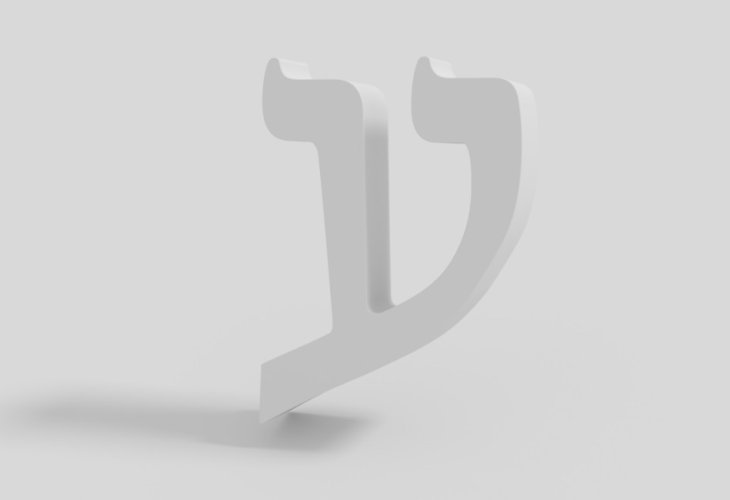The Letter Ayin – Transition Between Spiritual and Material
Why is someone who cannot see called blind? And what moral lessons are specifically hidden in the letter Ayin?
 (Photo: shutterstock)
(Photo: shutterstock)The letter Ayin is one of the seven letters requiring crowns on three of its tags in Hebrew script, symbolizing a deep engagement with the Torah for the sake of Heaven, rather than for personal gain or honor. One who aligns his actions with the divine will and controls his urges is granted a crown of royalty, as true mastery is self-rule guided by Torah.
Uses of the Word "Ayin"
The Hebrew word "ayin" stands for sight, and is used metaphorically to imply appearance, as in the phrase "ve-kisa et-ein ha-aretz" meaning 'and cover the sight of the land.' Similarly, "me-ein" is used for resemblance: "this resembles that." The word "ayin" also denotes color in terms of visual perception, explaining the phrase "ve-eino ke-ein ha-bedolach" about the color of manna, reflecting the eye’s perception of light.
Material and Desirous Eye
The letter Ayin conveys depth and tangibility, contrasted with the spiritual Alef and softer, feminine sound of Hey. Words changing Alef to Ayin shift from spiritual to material: אור (light) becomes עור (skin), עושר (wealth) from אושר (happiness), and so forth. Hence, one whose "ayin" (eye) is closed is "iveir" (blind), lacking vision.
Those prioritizing physical sight over sprituous insight may descend into poverty, as indicated by the letters of "ayin" forming "ani" (poor), symbolizing the spiritual "yud" relegated to the end. Misusing Ayin’s perception leads to failure, graphically represented by the letter’s shape of a slipping figure.
In an allegory from Midrash "Otiyot de-Rabbi Akiva," the letter Ayin falls and bends, symbolizing the downfall of Esau’s lineage and his spiritual adversary, embodied in worldly greed, contrasting with Jacob’s spiritual satisfaction and trust in Hashem.
Moral Lessons Hidden in Letters
In the sequence Samech-Ayin-Peh-Tzadi, it is symbolized: the one who closes his eye (Ayin) and mouth (Peh) to negativity is a righteous (Tzadi) person. Supporting the needy through words and material aid also marks righteousness.
To purchase Rabbi Zamir Cohen’s book "The Code," visit Hidabroot Shops.

